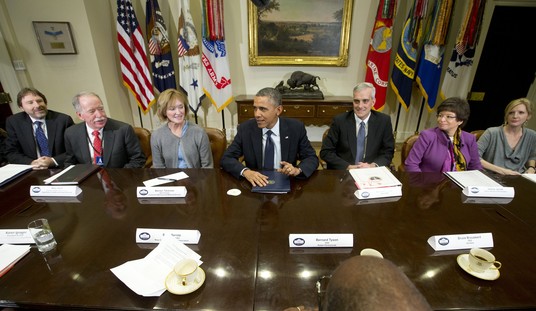The divorce between the United Kingdom and the European Union finally reached completion within the past hour. Both sides have agreed in principle on a far-ranging trade agreement that will avoid tariffs and sanctions, but will require more bureaucracy and coordination, at least in the short term. Reactions thus far have been largely positive, but perhaps none so positive as this from Prime Minister Boris Johnson, one of the leading authors of Brexit:
The deal is done. pic.twitter.com/zzhvxOSeWz
— Boris Johnson (@BorisJohnson) December 24, 2020
Johnson followed up the tweet with a more traditional announcement:
“I’m very pleased to tell you, this afternoon, that we’ve completed the biggest trade deal yet, worth £660bn a year”
UK Prime Minister Boris Johnson says the EU-UK trade deal takes “back control of our laws and destiny”
https://t.co/OmEeMh6LuI pic.twitter.com/GQ7YHTnPic— BBC Breaking News (@BBCBreaking) December 24, 2020
The deal comes in just eight days short of the hard-Brexit deadline. Rather than erecting trade barriers to which some had resigned themselves, the two sides are looking toward a more cooperative than contentious relationship, reports the Wall Street Journal:
Under the terms of the accord, both sides will continue to trade free of tariffs but there will be significant new bureaucracy for importers and exporters. The free flow of workers between the two economies will end and trade in services will be much reduced. London’s vast financial center will no longer have guaranteed access to European markets.
The deal gives Britain significant freedom to depart from EU regulations and sign free-trade deals with countries like the U.S. But as the price for securing a deal without tariffs, the U.K. agreed that it wouldn’t seriously undercut EU standards on issues such as labor and the environment and would maintain similar constraints on the subsidizing of private industry.
The agreement must formally be ratified by the European and U.K. parliaments and signed off by EU leaders before the end of the year. Capitals have insisted they need proper time to comb through the text before approving it. Though their approval is likely, France has warned it could veto a deal if some of its key concerns, including access to British waters for its fishing fleet, aren’t met.
That does look like a pure win for Johnson, whose tough line on Brexit had gotten much criticism on both sides of the channel. However, buried in this agreement is a poison pill that might do more damage to Johnson in the long run:
Failure to seal an agreement before Jan. 1 would have resulted in the automatic imposition of tariffs, border delays for basic goods such as food and medicines, and serious recriminations among Britain’s European allies.
The lack of a deal also would have likely intensified sectarian tensions on the island of Ireland, raising fears that the peace process there could be jeopardized. After Jan. 1, Northern Ireland, which is part of the U.K., will in practice remain in the EU’s customs area and single market, meaning a customs border won’t be needed with EU member Ireland to the south.
There’s a reason why Irish PM Micheál Martin calls this a “very welcome” deal. It basically severs Northern Ireland’s economy from London and forces the six counties to live under EU control. In practice, that will eventually make them even more Irish than British over time, precisely the scenario that spooked the DUP. The unionist party, which at one time forced Theresa May to avoid precisely that concession by contributing to her parliamentary majority, will feel betrayed — and culturally, those who identify with British citizenship will feel the same over time. This deal is likely to accelerate a movement in the enclave toward the Republic of Ireland and add a whole other meaning to the term “Brexit.”
The same will be true in Scotland, which already has a separatist movement that could well outpace that in Northern Ireland. Ironically, the Scots will resent staying within the UK while the unionists in Northern Ireland will resent being economically expelled from it:
#BREAKING Scotland's future as 'an independent, European nation': First Minister Sturgeon pic.twitter.com/IWbxzdImi9
— AFP News Agency (@AFP) December 24, 2020
That’s a bit farther down the road, of course. In the near term, unless an EU member country unexpectedly balks, businesses on both sides can breathe a sigh of relief. And then they had better start cramming for the tests to come eight days from now:
Businesses will still have to wait to read the hundreds of pages of documents that will detail how the trading relationship will change in just a week, from rules-of-origins requirements (to determine, say, if an item is truly “British” if it contains parts made elsewhere) to the mutual recognition of qualifications (to allow a British lawyer or architect to work on a project in Lisbon).
But the relief of actually reaching a deal, and the potential for future cooperation, will reassure many.
“A deal can limit some of the damage” of leaving the single market and customs union, economists at Berenberg, a private bank, wrote in a note. “By removing a major downside risk to the U.K. economy both in the near-term and long-term, a deal would unlock significant investment in U.K. and support the recovery once the ongoing coronavirus shock starts to fade.” This would benefit stocks and the British pound next year, they added.
Without an agreement, the two sides would have ended up trading on World Trade Organization terms, the default set of trade rules between most countries. That would have led to high tariffs on agricultural products like cheese and meat, making them more expensive. Britons buying cars imported from Europe, and vice versa, would have faced costly tariffs, too.
Johnson’s correct in celebrating a return to national sovereignty, which the UK should never have surrendered in the first place. The European Common Market was a very good idea, but the super-national governance of the EU is bound to either end up in dissolution or stagnation in the long run, and perhaps the latter has become an issue already. But breaking union bonds in this fashion while appealing to nationalism sets a very interesting precedent for a country that calls itself the United Kingdom. And don’t think Scots nationalists and Irish reunification advocates won’t use it, either.








Join the conversation as a VIP Member